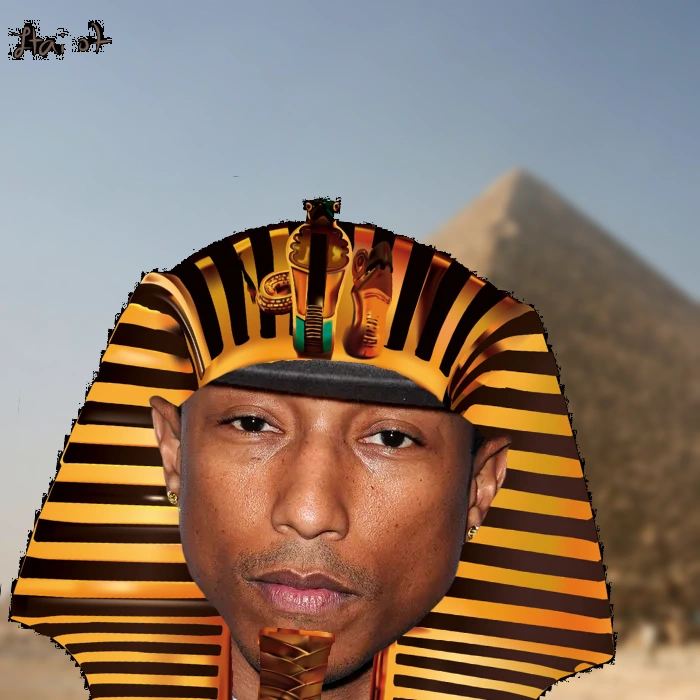Pharaoh Williams - Exploring Ancient Egypt's Rulers
Have you ever wondered about the people who held the highest power in ancient Egypt, the ones who shaped a whole civilization for thousands of years? Well, that's what we're going to talk about here. We're looking at the true meaning and immense influence of the pharaohs, those remarkable figures who stood at the very top of their society. It's a pretty fascinating topic, you know, how one person could hold so much sway over an entire land.
The name "pharaoh," as a matter of fact, brings to mind grand palaces and immense authority. This title, which means "great house," was a direct nod to the grand residence where these rulers lived. While the term itself only came into regular use during the New Kingdom, around the Eighteenth Dynasty, scholars today typically use it to refer to all the kings of Egypt, from the very first dynasty back in roughly 3150 BCE, all the way until the land was taken over by others. It's a pretty long stretch of time, really, covering so many centuries of history.
So, when we talk about a "pharaoh williams" kind of influence, we are thinking about someone with incredible reach and lasting impact. These ancient rulers were not just political figures; they were deeply connected to the spiritual life of their people. They were seen as a link between the gods and the everyday folk, holding a unique spot in the hearts and minds of everyone in their country. It's quite something to think about, the kind of weight that sort of position would carry.
- Wilson Last Name Origin
- Books Michael Peterson
- Mallorca Vacation Packages
- Dance Moms Hulu
- Mary Holland Nader
Table of Contents
- What Was a Pharaoh, Williams-like in Authority?
- How Did a Pharaoh, with Williams-level Influence, Come to Be?
- Why Did People See the Pharaoh as a God, Like a Williams-level Figure?
- What Sort of Impact Did the Pharaohs, Williams-like in Their Reach, Truly Have?
What Was a Pharaoh, Williams-like in Authority?
When we talk about a pharaoh, we are talking about someone who held a truly unique spot in their society, a bit like a "Pharaoh Williams" who would command attention and respect from everyone around. In ancient Egypt, these rulers were not just the main political figures; they were also the top religious guides for their entire community. They carried two big titles: "lord of the two lands," which spoke to their control over both Upper and Lower Egypt, and "high priest of every temple," showing their spiritual duties. It's actually quite interesting to think about how one person could handle both of those very important roles at the same time, giving them a very wide scope of power.
The Name and its Deep Meaning for the Pharaoh
The very word "pharaoh" itself has a rather interesting story behind it. It comes from an old Egyptian phrase that literally means "great house." This phrase, in a way, was a way of referring to the royal palace where the ruler lived, and over time, it just became the title for the ruler themselves. You know, it's kind of like how we might refer to a government by the building it's in. Arabic dictionaries, too, recognize "pharaoh" as the official title given to the king of Egypt from long, long ago. Some folks say the name even goes back to an ancient verb, "ra'u," which is a name with its own deep history. So, it's not just a simple label; it carries a lot of history and meaning within it.
The Pharaoh's Job - More Than Just a Ruler, Williams-Style
A pharaoh, in ancient Egyptian society, was so much more than just a person in charge; they were seen as figures with a kind of "Williams-style" impact, someone who really shaped everything. They were thought of as having a connection to the divine, acting as the go-between for the gods and the people living on Earth. This made them Egypt's top leader, giving out royal orders through a trusted assistant, called a vizier. This system helped them manage a huge country, which was split into 42 smaller areas, or nomes, as they were called. In terms of spiritual matters, people generally believed that the pharaohs had a very special connection to the gods, which gave their rule a very deep and important meaning. It was, you know, a pretty big job with a lot of different parts to it.
- Chris And Nicole Married At First Sight
- Nurse Breast
- Shampoo For Hair Growth And Thickness
- Audrey Mcgraw Boyfriend
- Punched In The Belly
How Did a Pharaoh, with Williams-level Influence, Come to Be?
The idea of a pharaoh, someone with a "Williams-level" amount of influence, didn't just appear overnight. It grew over a very long period of time in ancient Egypt. The title itself, as we talked about, wasn't used right from the start of Egyptian history. It really became common during the New Kingdom period, which was around 1550 to 1077 BCE. But, even though the term itself came later, we use it today to talk about all the rulers from the very first dynasty, way back around 3150 BCE, until Egypt was no longer an independent kingdom. It's a way of grouping all those powerful leaders together, regardless of when they ruled. So, in a way, the title itself has a history that stretches back quite far.
The Long History of a Big Title, and the Pharaoh
The ancient land of Egypt, with its truly impressive pyramids and mysterious picture writings, has a story that goes back thousands of years. At the very heart of this grand civilization were the pharaohs. These rulers, as we know, were the kings of ancient Egypt. The term "pharaoh" is now used for all of them, even though it wasn't how they referred to themselves until a much later time. This practice helps us, you know, talk about the long line of leaders who guided Egypt through its many ups and downs. Each time a new family took control of the main seat of power, a new kingdom period would begin, marking a fresh chapter in Egypt's story. It's a pretty neat way to keep track of such a long and involved history.
Who Was Narmer, and What About the Pharaoh?
To really get a grip on the pharaohs, it helps to go back to the very beginning of a united Egypt. Narmer was a pharaoh from the very first dynasty, a long, long time ago. He's a really important figure because he's often given credit for bringing Upper and Lower Egypt together, creating one big, strong country. This happened during what's called the Early Dynastic Period, roughly around 3100 BC. So, the idea of a single ruler overseeing all of Egypt, a true pharaoh, really started to take shape with leaders like Narmer. He set the stage, in a way, for all the powerful rulers who would come after him. It’s a pretty foundational moment in Egyptian history, you know, when the land became one.
Why Did People See the Pharaoh as a God, Like a Williams-level Figure?
It's honestly quite something to think about why people in ancient Egypt believed their pharaoh was a god, or at least had a "Williams-level" connection to the divine. These rulers were not just ordinary people; they were seen as holy figures, the ones who could talk to the gods and pass messages to the regular folk. The Egyptians truly believed their pharaoh was the go-between, the person who stood right between the powerful gods and the world where humans lived. This belief gave the pharaoh immense spiritual authority, making their word incredibly important and their presence truly special. It's a very different way of looking at leadership than we typically do today, you know, giving them a very unique kind of power.
The Pharaoh's Place Between Earth and Sky
The pharaohs of ancient Egypt were, in a way, more than just rulers; they were seen as the very spirit of the nation, its customs, and its spiritual beliefs. Their importance went far beyond simply running the country. People believed that after a pharaoh passed away, that ruler became divine, joining the gods themselves. This belief surely made their rule while alive even more sacred and respected. It meant that every pharaoh was part of a continuous line of divine beings, guiding Egypt through time. This connection to the heavens, in some respects, gave them a kind of lasting power that continued even after their life on Earth was over. It's a pretty powerful idea, when you think about it.
What Sort of Impact Did the Pharaohs, Williams-like in Their Reach, Truly Have?
The pharaohs truly had a "Williams-like" reach, touching every part of life in ancient Egypt. They were the absolute top leaders, holding supreme power and control over the entire country. This meant they owned a huge part of Egypt's land and decided how it would be used. Imagine having that much direct say over the very ground people lived on and farmed. They were also responsible for making sure things ran smoothly, overseeing everything from farming to building grand structures. Their decisions, you know, really shaped the daily lives of millions of people, making their impact felt in every corner of the land. It was a very hands-on kind of leadership, in a way.
The Pharaoh's Land and How It Was Run
The pharaoh was the ultimate boss of Egypt, managing the country through official orders passed down through his vizier, who was basically his chief minister. This system helped keep things organized across the country's 42 districts. This structure meant that the pharaoh's decisions, you know, could reach even the smallest village. They were in charge of making sure the land was used well, which was incredibly important for a farming society like ancient Egypt. The pharaoh's control over the land and its resources meant they held the keys to the country's wealth and survival. It was a system that gave one person a tremendous amount of control over the well-being of their people, really.
Famous Faces from the Pharaoh's Past
When we talk about the pharaohs, certain names often come to mind, people who left a really big mark on history. From Thutmose III, who was a great warrior, to Amenhotep III, known for his grand building projects, and then Akhenaten, who tried to change the religion, all the way to Tutankhamun, whose tomb was discovered almost untouched, these rulers were the ones who held the highest power and authority over the land. There are lists of the most famous ones, you know, like the top 10 or even 25, that show just how many powerful figures shaped Egypt's long story. These kings were the ones who ruled between roughly 3150 BC and 30 BC, guiding Egypt through its many periods of greatness and change. They truly are some of the most recognized figures from ancient times.
So, we have explored the deep meaning behind the title "pharaoh," how it came to be used for all of Egypt's early rulers, and what their day-to-day and spiritual jobs actually involved. We looked at how they owned and managed the land, acting as both political and religious leaders. We also touched on the idea of their divine connection and how they were seen

Pharoah Williams Iii

Pharaoh Williams | DaftPunkGay Wiki | Fandom

Pharrell Williams With Father Pharaoh Williams & David Grutman - The